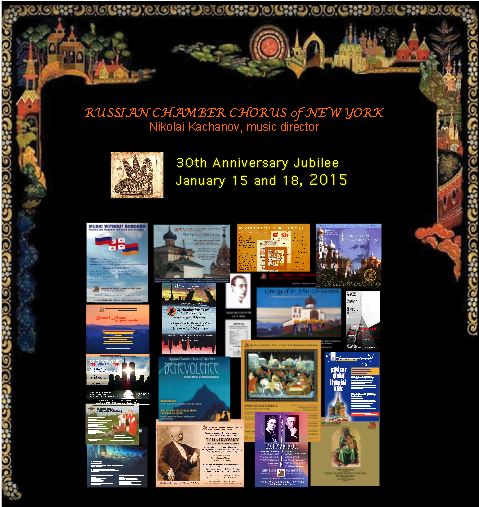 The
Russian Chamber Chorus of New York (RCCNY), a unique member of the New York
choral community, celebrates its 30th anniversary with a series of concerts on
January 15 and 18, 2015. The “anniversary jubilee” program will highlight some
of the biggest audience favorites over the years.
The
Russian Chamber Chorus of New York (RCCNY), a unique member of the New York
choral community, celebrates its 30th anniversary with a series of concerts on
January 15 and 18, 2015. The “anniversary jubilee” program will highlight some
of the biggest audience favorites over the years.
Nikolai Kachanov founded the choir in 1984 with the dream of building a cultural bridge between the United States and Russia. The choir’s concert programs have included every genre of Russian choral music, as well as music from Belarus, Ukraine, Latvia, Lithuania, Estonia, Georgia, Armenia, Poland, Hungary, the United Kingdom and the United States--bringing listeners together to celebrate rich, varied musical heritages. The group has performed in venues as varied as Carnegie Hall and the Prairie Home Companion radio show stage and has recorded five acclaimed albums.
In this particular anniversary year, Kachanov recognizes that this cultural bridge requires maintenance more than ever. In light of recent geopolitical events, Kachanov changed the program lineup. His original vision was to feature a piece that celebrates the power of Russia. Kachanov instead has chosen to showcase a work by a Georgian composer, Giya Kancheli, who now lives in Belgium. The title of Kancheli’s work is Senseless War, a haunting indictment of the futility of conflict.
The piece has late Romantic compositional undertones, and a modern arrangement borrowed from the jazz tradition: the choir is accompanied by the New Hudson Saxophone Quartet. Kancheli’s protest against war is realized not through slogan-like appeals for vengeance or an imploring for peace. It is reached by contrasting musical constructions--for example, when silence is interrupted by sharp tutti sections, resonating as shockingly as rifle shots, in ugly discord with the universal harmony. The piece employs pauses that are full of sound, as though the composer asks us to listen to silence itself. Listening attentively to these fragments of universal silence--framed by musical passages that are sometimes moving and poetic, sometimes powerful and threatening--brings us nearer to the composer’s inspiration. According to Kachanov, "Senseless War is born from silence, and into silence it departs."
The concert will also feature music by Sergei Rachmaninoff, a mainstay of the choir. In this case, selections from his monumental, less-performed Liturgy of St. John Chrysostom, in which Rachmaninoff’s setting turns evangelical texts into vivid, nearly operatic scenes with intricate, symphonic elements of musical development. Despite Rachmaninoff's use of the traditional liturgical order, he did not tap time-honored church melodies, but drew upon original or folk tunes, creating a less iconic reference to the traditional Russian church and a more personal approach to the sacred texts. Rachmaninoff’s liturgy was one of several great religious works to be banned from performance in the Soviet era.
The choir will also present a double concerto for choir by Ukrainian composer Dmitry Bortnyansky, Glory to God in the Highest. Bortnyansky was one of the most influential composers of his time in Russia. His mission was to bring western knowledge of music to Russia at a professional level. His liturgical music is known as Russian Baroque because it combines eastern and western European styles, incorporating the polyphony that he learned while studying in Italy.
The concert also features a work by RCCNY’s own artistic director entitled Benevolence, which is based on the writings of Nicholas Roerich (born in 1874-- this is Roerich’s 140th anniversary year). Roerich was a Russian painter and poet who dedicated his life to serving truth and beauty, elements that transcend conflict and unify us in our humanity. Roerich dedicated a great deal of his life to advocating for formal protections for works of art and culture in times of war. Roerich’s cycle of verses, Flame in Chalice (1929), was inspired by Eastern wisdom, and reflects a universal spirituality. Kachanov’s five-part choral cycle based on these texts continues the traditional genre of the Russian choral miniature. At the same time, the work encompasses an original synthesis of Eastern and Western musical techniques, including improvisation, polyphony and harmonic singing using undertones and overtones in the Tuvan and Tibetan traditions.
The Russian Chamber Chorus of New York’s 30th anniversary jubilee will be a celebration of great compositions from Russia and beyond, and also of the humanist ideal, borne out by the ideas of those who lived through the conflicts of the last two centuries.
The Russian Chamber Chorus of New York (www.rccny.org) performs its "30th Anniversary Jubilee” first on Thursday, January 15, 2015, 8:00 PM at Holy Trinity Lutheran Church, Central Park West at West 65th Street, Manhattan. Tickets: $25; students/seniors $20; buy tickets -- 20% discount through January 12, 2015. The second performance is Sunday, January 18, 2015, 4:00 PM at Brick Presbyterian Church, 62 East 92nd Street (at Park Avenue), Manhattan. Tickets: $25; students/seniors $20; buy tickets -- 20% discount through January 15, 2015. For more information, visit www.rccny.org/ConcertSchedule.html.
Jason Zahorchak is a tenor enjoying his third year with the Russian Chamber Chorus of New York. Thanks to Maria Bromberg for translations.
